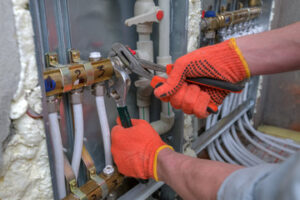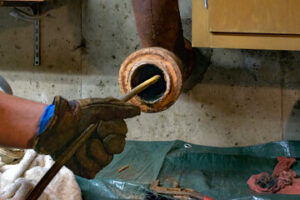Plumber Westminster installs, repairs, and maintains water and sewage systems. They use a variety of tools to inspect pipes and fixtures for leaks, corrosion, breaks, or clogs. They also test water pressure and drainage flow rates.

A career as a plumber offers many benefits, including good pay and job security. However, it’s important to understand the pros and cons of this profession before choosing this skilled trade.
A plumber’s duties include designing piping systems that disperse water and remove waste in residential, commercial, and industrial settings. They also inspect those systems for safety and proper functioning. They check for potential hazards like leaks near electricity, improper venting of gas appliances, and cross-connections between water sources. They also compare visible plumbing to local code requirements for material selection, installation, and design.
Plumbers use a variety of tools to inspect pipes and other components, including those that are hard to reach. They may also run cameras through drain lines to locate blockages and other problems. Once they have finished the inspection, they provide a report with their findings and recommendations for repairs or upgrades. They can also advise customers on ways to reduce their energy bills through better insulation and water-saving fixtures.
Plumbing inspections are especially important for new homeowners or those thinking of purchasing a home. These reports identify any existing issues that need to be addressed before the purchase is finalized. This allows buyers to renegotiate the price or ask for repairs from the seller. In some cases, problems with a plumbing system are so severe that the sale of a home cannot move forward until they are resolved.
A plumber’s inspection will cover all accessible water and drainage pipes, faucets, showerheads, toilets, and appliances like dishwashers and washing machines. The plumber will examine each fixture for signs of leaks, corrosion, rust, and other damage. They will also check the water pressure at each fixture to ensure it is within the normal range. If a problem is found, the plumber will recommend an appropriate solution and give estimates for the cost of the repair. They will also suggest preventative maintenance procedures to keep the plumbing in good condition.
Repair
As a homeowner, there will be times when you need to call in a plumber for repair work. These professionals handle everything from fixing leaky faucets to replacing old water heaters. They can also help you make the most of your water usage by installing appliances like low-flow toilets and water-saving shower heads.
Residential plumbers can also handle more complicated plumbing jobs, such as rerouting pipes to accommodate for home additions or remodels. They are familiar with the local building codes and can ensure that your new construction or renovation is up to code. In addition to this, they can also take care of more specialized plumbing tasks, such as setting up gas lines or working on sewer systems that run through your property.
When you have a plumbing emergency, it is important to call in the professionals as soon as possible. This will help prevent further damage and minimize costs. Plumbers will be able to diagnose the problem and implement the necessary repairs quickly and effectively. They can also advise you on ways to avoid future problems, such as by performing regular maintenance or by changing your water habits.
Commercial and industrial plumbers deal with large-scale plumbing systems in office buildings, factories, restaurants, and other facilities. They are responsible for repairing and maintaining these complex systems, which require special training and knowledge. In some cases, these plumbers may need to work on dangerous or corrosive chemicals.
While some people try to fix their own plumbing issues, this is usually not a good idea. Not only can it lead to more costly repairs down the line, but it can also be hazardous to your health. Professional plumbers have the tools and equipment to deal with even the most difficult problems, minimizing damage and saving you time and money. Besides handling routine maintenance and emergency repair work, they can also assist you in reducing your energy bills by installing more efficient heating and cooling systems. They can also perform power flushes on your radiators to remove sludge and debris, ensuring that your system is running as efficiently as possible.
Installation
Plumbers are responsible for installing and repairing the plumbing and sewage systems that keep modern societies running smoothly. They install water heaters, garbage disposals, and other household fixtures like sinks and toilets. Their work can also extend to laying out pipework for construction projects and connecting heating and cooling systems. Plumbers must also be knowledgeable about interpreting blueprints and plans in order to ensure that their installations are up to code.
Those interested in becoming a plumber should have a high school diploma or equivalent accreditation. They should also undergo an apprenticeship to learn the skills of the trade and gain on-the-job experience. An apprenticeship can last two to five years and involves working alongside a licensed plumber under close supervision. After completing their apprenticeship, plumbers must pass a state exam to become licensed journeymen.
Plumbing work is physically demanding and requires dexterity to maneuver pipes and fixtures. It is also important for plumbers to have good problem-solving skills to address issues, as they may encounter obstacles while performing their duties. Additionally, plumbing jobs often require standing for long periods of time and working in tight spaces. Plumbers who are comfortable with physical demands and have excellent customer service skills can be very successful in this field.
Some plumbers specialize in residential and commercial plumbing. Those who choose to focus on residential plumbing services usually work on plumbing systems in homes and apartment buildings. These plumbers can be found fixing faucets, toilets, and showers as well as addressing more extensive plumbing problems like broken water lines and septic tank systems. Commercial plumbers, on the other hand, tend to focus on large-scale plumbing systems in office buildings, malls, and other commercial facilities. They can be found installing and repairing toilets, sinks, and other bathroom fixtures as well as maintaining plumbing for kitchens and fire sprinkler systems.
Another specialization for plumbers is working on gas lines. These plumbers are responsible for ensuring that all gas appliances and fittings are properly installed and connected to the main gas line. They also perform inspections to detect any leaks or corrosion of the gas lines. Plumbers who specialize in this area should have extensive knowledge of local, state, and federal regulations regarding gas line installation and maintenance.
Maintenance
A plumber’s job is to provide customers with solutions for their wastewater problems that include water drainage line and sewage upgrades and repairs. They also install appliances such as water heaters, dishwashers and toilets. They also offer plumbing maintenance services such as drain cleaning, clog removal, and routine inspections.
Plumbing is a skilled trade that requires training and certification. A high school diploma or GED certificate is the minimum educational requirement, and most plumbers complete a formal apprenticeship program that lasts two to five years. Apprenticeship programs give students hands-on experience working alongside experienced plumbers and allow them to earn a living while they learn the trade.
Professional plumbers have the knowledge and expertise to quickly diagnose plumbing problems and provide accurate solutions. They use state-of-the-art tools and technology to assess and repair issues efficiently. Plumbers can also perform regular preventive maintenance on pipes and fixtures to help avoid expensive repairs down the road.
Commercial plumbing is a specialized field that deals with the installation, repair and maintenance of plumbing systems in offices, restaurants, malls and other large buildings. These systems are more complex than residential plumbing, and plumbers who specialize in commercial work must be familiar with building codes and regulations. Commercial plumbing services also include installing and repairing sprinkler systems.
One of the most important skills for plumbers to have is excellent communication. They must be able to explain complicated issues in easy-to-understand terms so that customers understand what needs to be done. They also need to be able to listen to customer concerns and respond appropriately.
Plumbers are often required to work on weekends and evenings to address emergency situations. This can interfere with family life, and it is important for plumbers to find a balance between their career and their personal lives. In addition, the physical demands of the job can be challenging for some people. Plumbers spend a lot of time on their feet, and they must be able to lift heavy equipment and crawl into tight spaces. They are also exposed to hazardous materials and dangerous conditions.

